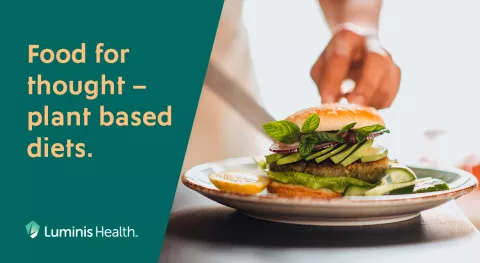We all know we shouldn’t eat fast food, but most of us can’t help ourselves. The convenience, speed, and flavors of fast food make it tempting, but it’s important to recognize that ultra-processed foods come with health risks.
While there are many definitions, think of ultra-processed as food you can’t make from scratch.
Sixty percent of the average American adult’s diet consists of ultra-processed food. Diets heavy in ultra-processed foods are linked to higher risks of obesity, type 2 diabetes, heart problems, cancer and more. That’s because the food industry designs these foods so we crave and buy them more. As a result, these foods contain higher amounts of sugar, salt, and fat, and lower amounts of fiber compared to less processed alternatives. One study found that people ate 500 more calories a day when offered diets based on canned or processed meats and frozen potato sides, compared to those who ate fruits, vegetables, and fresh meats. The good news? It’s easier than you think to cut back on ultra-processed foods.
Eat ultra-processed food in smaller quantities
Trying to cut out your favorite ultra-processed snacks altogether could set you up for failure. Instead, try to eat ultra-processed foods in smaller quantities. That way, you won’t fill up on high-in-calorie, low-in-nutrient food.
Don’t eat chips straight from the bag. Instead, put a handful in a small bowl to prevent overeating. At your favorite ice cream shop, order one scoop instead of two and skip the toppings. A rule of the thumb? Order the kids portion if possible.
Choose healthier ultra-processed options
Not all ultra-processed foods are created equally. Plain pretzels and whole-grain crackers and hummus are better than chips, since they have less saturated fat and calories.
Some ultra-processed foods can even be healthy. Whole grain bread without added sugar is technically ultra-processed but it’s also high in fiber and nutrient dense. When buying highly processed foods, compare calories, fiber, sugar, and salt content to make a healthier choice.
Watch your drinks
Beverages can be heavily processed too. Sports drinks and sodas have a long list of chemical ingredients. Caffeinated drinks can also be high in sugar and artificial flavors. A vanilla latte at a popular coffee shop might pack around 250 calories.
Stick to non-sweetened drinks like water and tea as much as possible. If you’re craving soda, try mixing juice and soda water. If you want to order coffee, choose one without flavors, as flavored coffees often include sugary syrup. You can also make your coffee healthier by skipping the whipped cream and requesting skim milk instead of whole milk.
Make smart choices at restaurants
We all need a break from cooking once in a while. Making healthier choices when going out to eat can be as simple as ordering a small burger without fries or soda.
On the side, consider a small salad and ask for a vinaigrette dressing, which packs far fewer calories than cream-based dressings. Avoid salad toppings, like croutons, bacon bits, or tortilla chips, which can be high in fat and salt.
Check the ingredients list
Foods low in sugar or fat are healthy, right? Not exactly because they are often packed with salt and additives. Pay close attention to the ingredients list and look for chemicals, like guar gum, polysorbates, mono- and diglycerides, carrageenan, and soy lecithin. Strive for products with fewer additives, as this often indicates a higher proportion of real food ingredients.
Pay attention as well to the daily value percentage, or how much of the maximum daily amount of sodium, fat, and sugar a product contains. If a package of beef jerky has more than half of the salt you should consume in a day, it’s probably not worth it.
The bottom line: small steps can add up
Whether you order your coffee with skim milk, skip the fries with your burger, or decide to have whole grain crackers as a snack, you are taking little steps that can make a big difference in your overall health.
Author
Nowreen Haq, MD, is an endocrinologist at Luminis Health who focuses on cardio metabolic outcomes, complex diabetes, obesity and transgender endocrinology.




